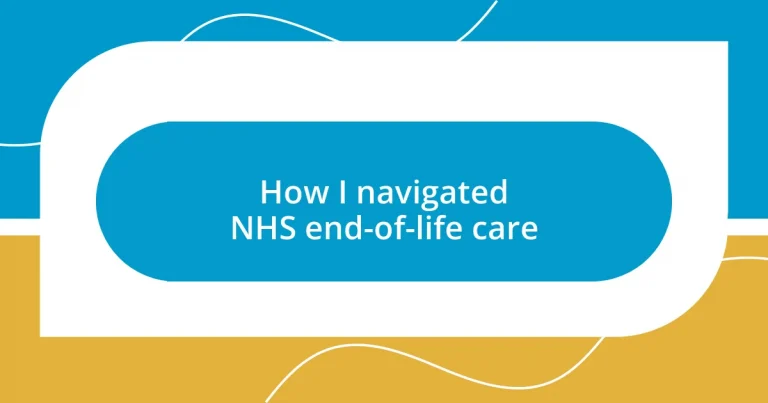Key takeaways:
- The importance of Advanced Care Planning ensures that patient desires are understood and respected, alleviating future decision-making burdens for families.
- Engaging with healthcare professionals fosters trust and clear communication, leading to better-informed decisions and emotional support during end-of-life care.
- Accessing support services, such as hospice care and community resources, empowers families and enhances the overall experience of navigating end-of-life situations.
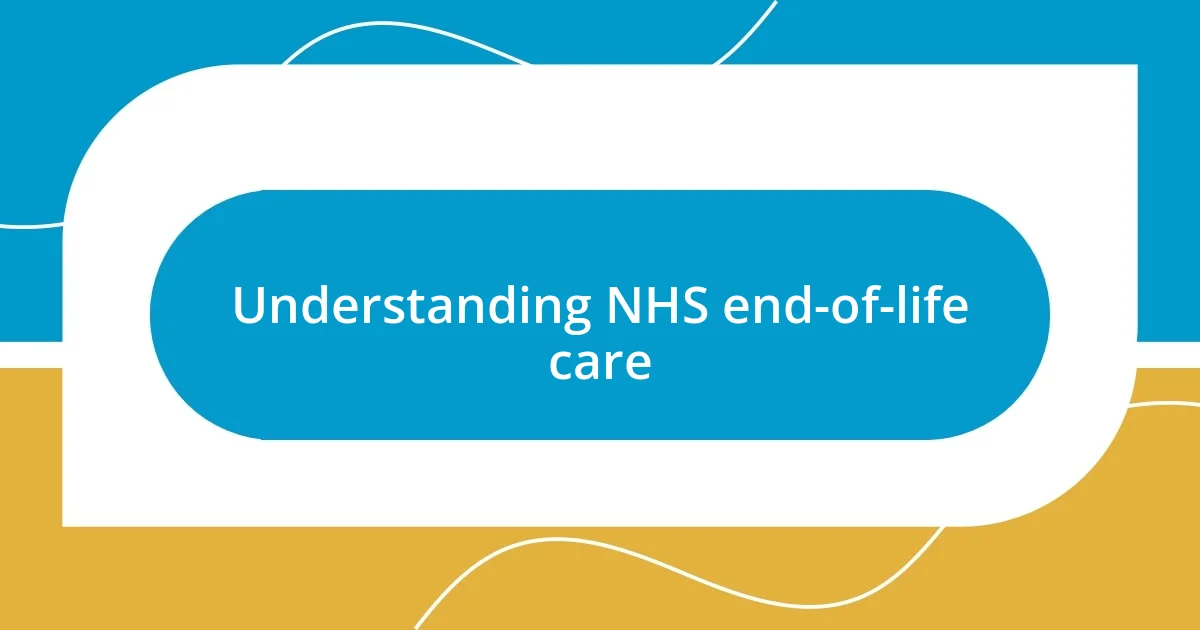
Understanding NHS end-of-life care
End-of-life care within the NHS is a multifaceted approach that prioritizes the patient’s comfort and dignity during their final days. I vividly remember sitting beside my grandmother, feeling a mix of sadness and relief, as the medical team supported her needs while respecting her wishes. It raises the profound question: how do we ensure that loved ones experience this crucial stage of life with the dignity they deserve?
The NHS emphasizes palliative care, which focuses on alleviating pain and providing psychological support. I often think about the kindness of the nurses who provided not just medical assistance but also genuine compassion, offering us reassurance in such a daunting time. It makes me wonder: how does the presence of empathetic caregivers change the experience of dying for both the patient and their family?
One critical aspect of NHS end-of-life care is the importance of Advanced Care Planning. I recall the conversations my family had, which helped clarify my grandfather’s wishes. This process isn’t just about the practicalities of care; it’s about deep, emotionally charged discussions that ensure individuals feel heard and respected. Have you ever thought about how this kind of planning could ease the burden for families grappling with difficult decisions?
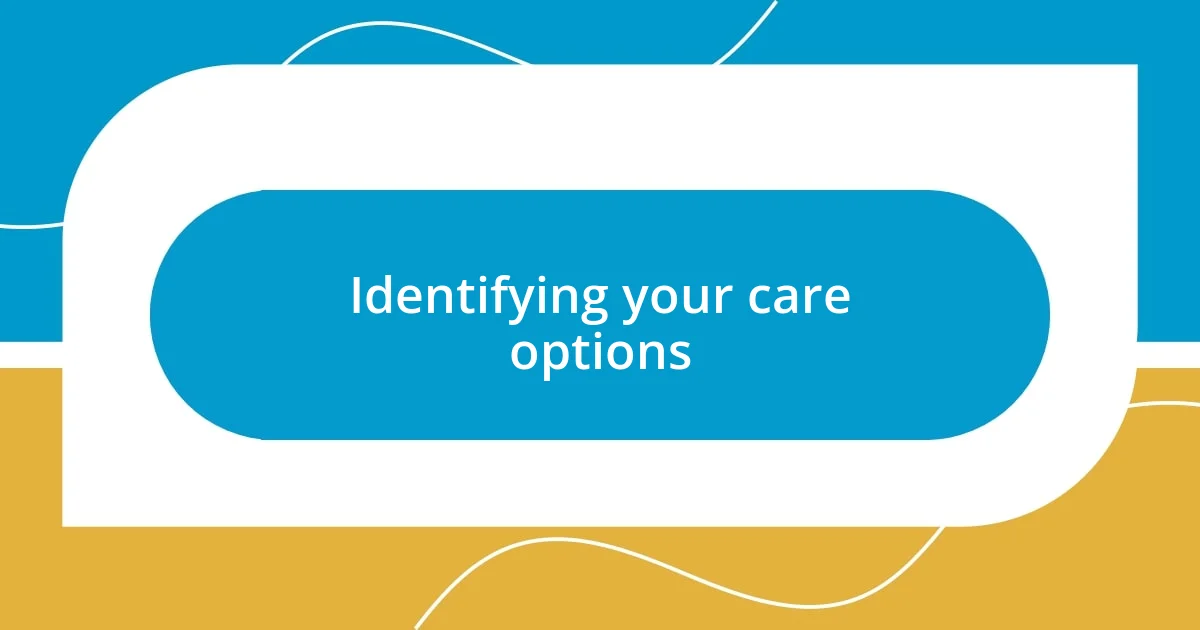
Identifying your care options
To identify your care options in the NHS, it’s essential to engage in open discussions with healthcare providers. During my experience with my grandmother, we met with her doctor, who explained various paths, including hospice care and community services. This conversation was eye-opening; I learned that understanding the available options could significantly impact our family’s journey.
Here are some key care options to consider:
- Hospice Care: Specialized care focusing on comfort for those nearing the end of life.
- In-Home Care: Nurses and support staff can come to your loved one’s home to provide medical and emotional assistance.
- Palliative Care Services: These services can be accessed at any stage of illness, focusing on improving quality of life.
- Advanced Care Planning: Encourages discussions about the future, ensuring everyone’s wishes are respected.
- Counseling and Support Groups: Emotional support can also be vital for both patients and families navigating this journey.
In my experience, exploring these options gave us peace of mind. We were empowered to make decisions aligned with my grandmother’s wishes, which, in turn, brought us closer together as a family during such a challenging time. It’s remarkable how conversations about care options can foster both understanding and connection.
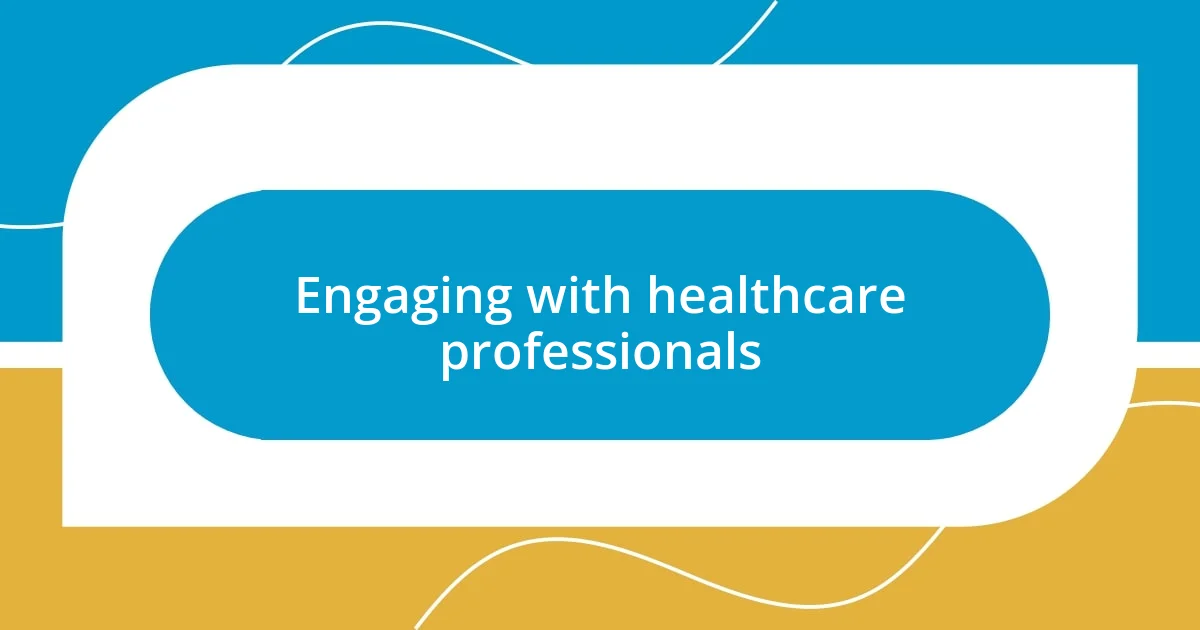
Engaging with healthcare professionals
Engaging with healthcare professionals is crucial during end-of-life care, as they hold valuable insights into what to expect. I remember a moment when my family and I met with the palliative care team; their approach was so understanding and respectful. It felt like a weight had been lifted off our shoulders, knowing that we had a team dedicated to ensuring my grandmother’s comfort and dignity. This type of engagement allowed us to ask questions and express our fears, which made a profound difference in the way we navigated her care.
When I reflect on my interactions with healthcare professionals, I can’t help but emphasize the importance of clear communication. I recall an instance when we were confused about the medications prescribed. A nurse took the time to explain why each one mattered, easing our anxiety and ensuring we felt informed. It’s amazing how a few moments of dedicated attention can foster trust and confidence. Have you found that effective communication with healthcare providers helped you in understanding a loved one’s care? I certainly did.
Developing a rapport with healthcare staff also enhances the entire experience of end-of-life care. One evening, I had a heartfelt discussion with a nurse who shared her own experiences with patients and their families. It was comforting to learn that she truly cared about each individual’s journey. These conversations allowed for a personal connection that transformed our relationship with the healthcare team. Engaging with professionals in this way not only provided us with essential information but also with emotional support that we desperately needed.
| Aspect | Importance |
|---|---|
| Communication | Clear dialogue fosters trust and alleviates anxiety. |
| Personal Connection | Building relationships with caregivers provides emotional support. |
| Informed Decisions | Understanding care options empowers families to make choices aligned with patient wishes. |
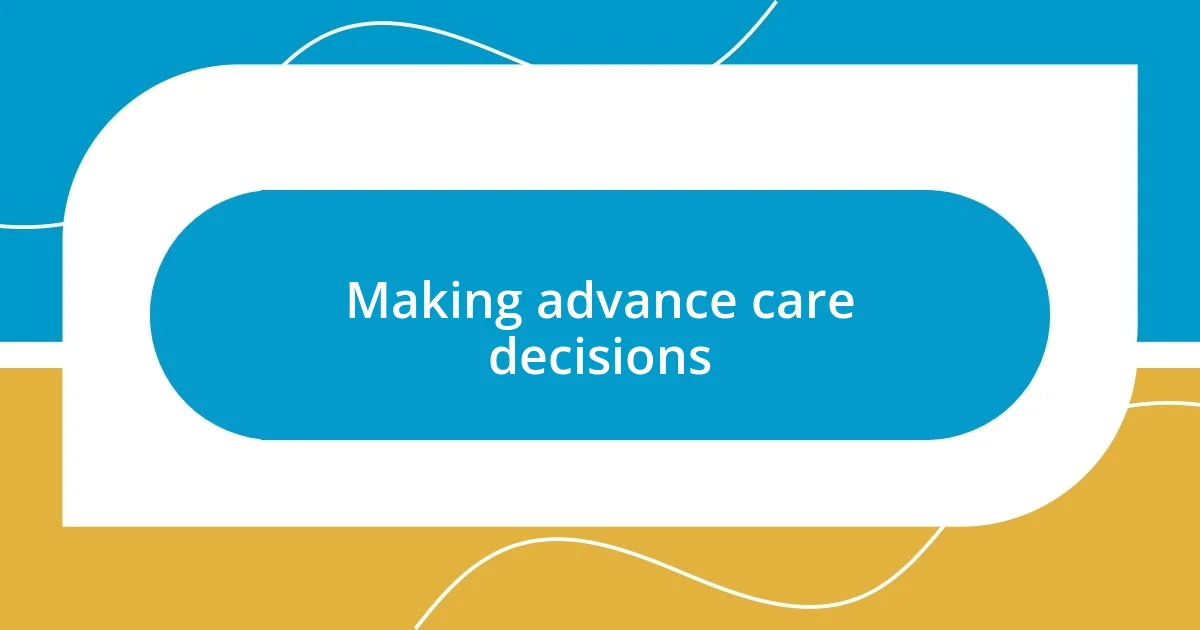
Making advance care decisions
Making advance care decisions can feel daunting, but it’s a crucial step that I found incredibly empowering. When my family gathered to discuss my grandmother’s wishes, emotions ran high. I remember sitting around the dining table, each of us sharing our hopes and fears, and it struck me how important it was for everyone to voice their thoughts. Encouraging this dialogue enabled us to honor her preferences while also easing the burden on ourselves. Have you ever experienced a moment when sharing feelings made a difficult situation feel lighter? I certainly did that day.
One aspect I learned was about advance care planning documents, such as living wills and healthcare proxies. Initially, I was confused about them, but after talking with our healthcare provider, it became clear that these forms could clarify my grandmother’s desires regarding her care. Filling them out together became a shared experience, transforming what seemed like a grim task into an opportunity for connection. I could see the relief in her eyes when she realized her voice would be heard, even if she couldn’t speak for herself later. Isn’t it powerful to know that decisions can still reflect their wishes?
Reflecting on our journey, I can’t stress enough how crucial it is to ensure these advance care decisions are revisited regularly. They should evolve as circumstances change, just like our conversations did over time. I recall discussing my grandmother’s care a few months later, and it was comforting to see how her priorities had shifted, allowing us to adjust her plans accordingly. How often do we forget that our loved ones’ preferences might change? Regularly revisiting these discussions can ensure that we remain aligned with their evolving desires, fostering an ongoing connection throughout the care process.
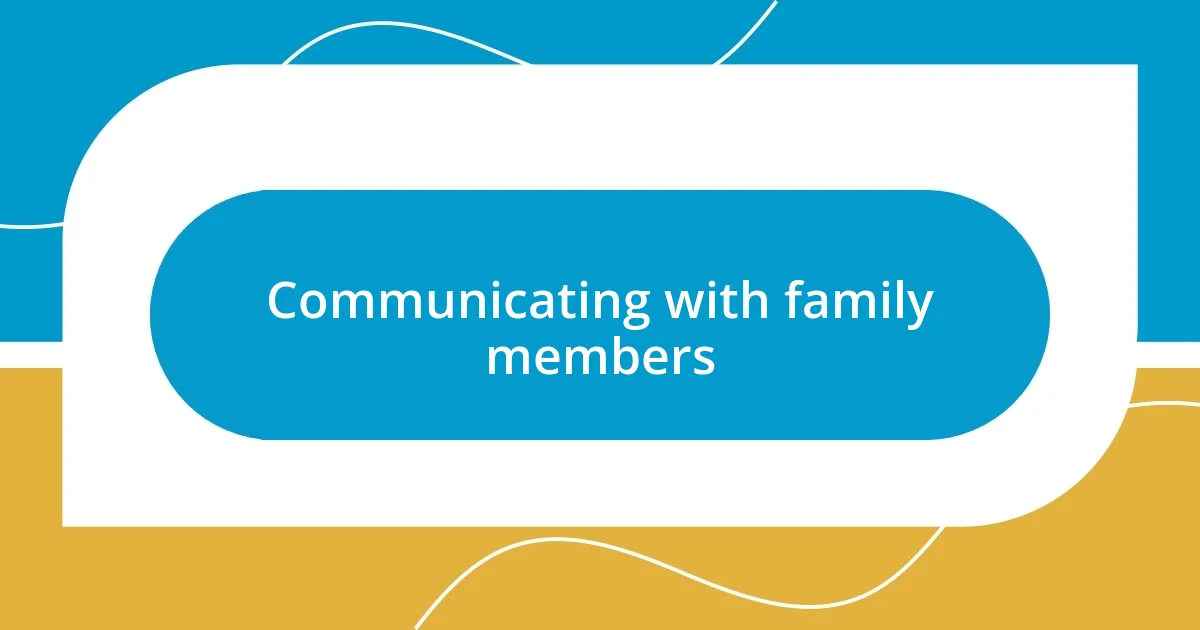
Communicating with family members
Communicating with family members during a loved one’s end-of-life care can be a delicate balancing act, filled with both heartache and moments of profound connection. I distinctly remember a day when we all sat quietly together, the atmosphere heavy with unspoken worries. It was in that silence where I felt it was essential to break the ice. “How are we all feeling about what’s happening?” I asked, and it opened the floodgates of emotions. Suddenly, everyone was sharing memories, fears, and even some laughter, which reminded us of the life we were celebrating, despite the sadness surrounding us.
One strategy that worked wonders for us was setting aside regular times to check in with each other. We began scheduling family meetings, even if it was just a quick phone call from afar. This practice transformed the way we related to one another; it became our safe space to voice our thoughts without judgement. During one of these check-ins, my brother opened up about his struggles with acceptance, and I realized how important it was for all of us to share honestly. Have you found that having a designated time to talk can actually alleviate some of the emotional burden? From my experience, that routine offered clarity and connection we desperately needed.
I learned that not all conversations have to be serious; sometimes, a touch of humor can break the tension. I recall a lighthearted moment when we jokingly debated what my grandmother would want served at her imaginary last meal. This allowed us to infuse some joy into what was otherwise a heavy topic. I couldn’t help but think, isn’t it remarkable how humor can be a powerful tool in easing pain? Finding ways to communicate openly, while allowing space for laughter, made our family bond stronger during such a challenging time. Ultimately, navigating these conversations brought us together and created an environment where love and understanding thrived.
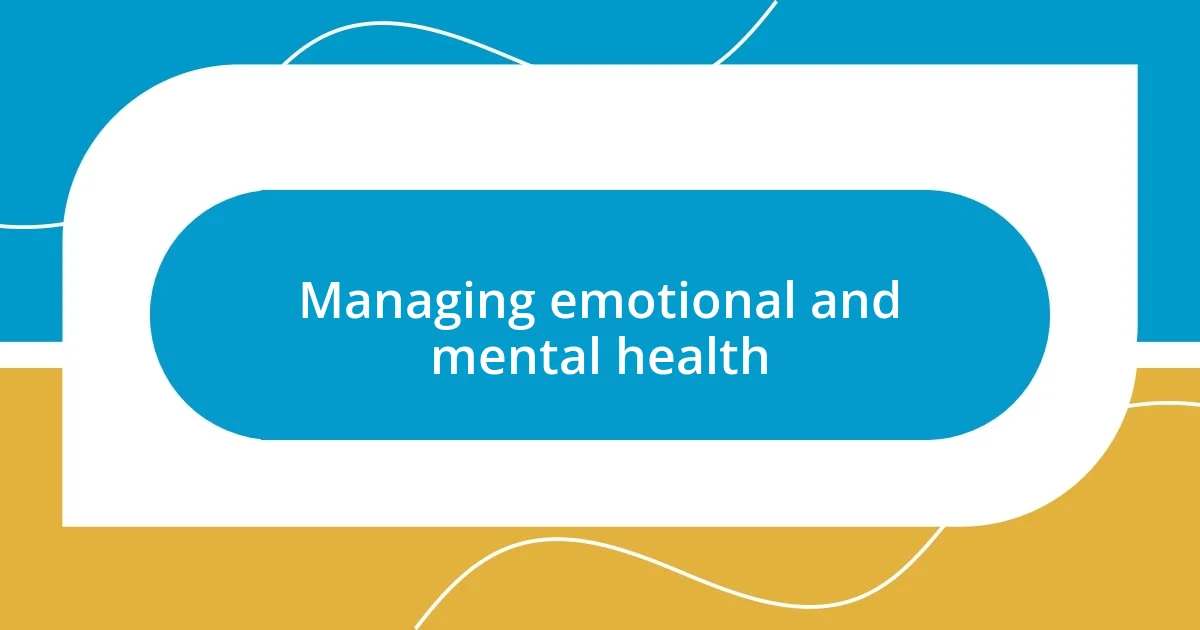
Managing emotional and mental health
Managing emotional and mental health during end-of-life care can be overwhelming, but I discovered that recognizing and expressing our feelings was vital for survival. I recall a moment when I broke down in tears while sitting with my grandmother, overwhelmed by the gravity of it all. Rather than hiding my emotions, I chose to share them with my family, and in doing so, I found a surprising sense of relief. Isn’t it interesting how vulnerability can forge deeper connections? That openness helped us all create a safe space to heal.
Another essential aspect was prioritizing self-care for myself and my family members. I remember carving out time for quiet moments of reflection, whether it was a long walk in nature or simply curling up with a good book. Those little breaks from the chaos were game-changers; they allowed my mind to reset, enabling me to approach difficult conversations with renewed strength. Have you ever noticed the difference when you take a step back? I found that those pauses made me more present for my grandmother—and for myself.
Lastly, I embraced the power of professional support. When the emotional weight felt too heavy, I sought guidance from a therapist who specialized in grief. This wasn’t a sign of weakness; rather, it became a lifeline that provided valuable perspectives. I’ll never forget how sharing my fears and frustrations in a safe environment not only validated my experience but also equipped me with coping strategies. Have you ever considered reaching out for help? It can feel transformative, allowing you to navigate through the labyrinth of emotions with a clearer mind.
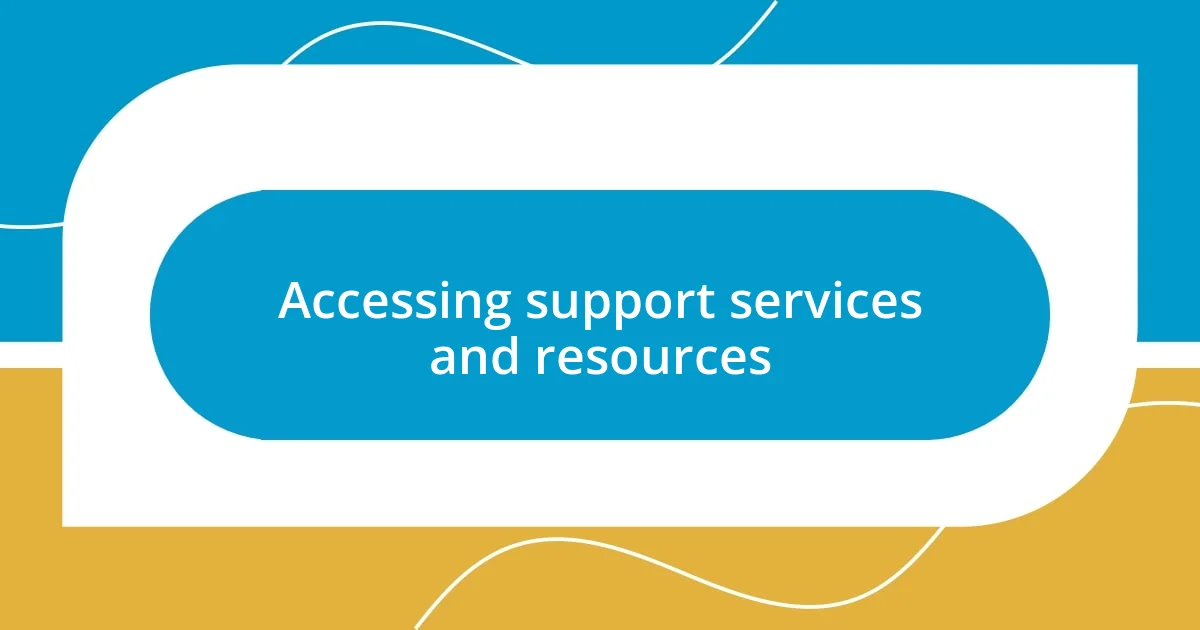
Accessing support services and resources
Accessing support services and resources is crucial when navigating the complexities of end-of-life care. I still remember the day we learned about local hospice services. Initially, I felt overwhelmed by the options but decided to reach out to a community organization that specialized in guiding families through these decisions. Have you ever felt lost trying to figure out what’s available? That first phone call turned out to be a turning point; they connected us with incredible resources, from homecare assistance to palliative care teams.
I found that taking advantage of online forums and support groups was invaluable. In those digital spaces, I encountered others going through similar experiences, sharing their fears and insights. It was comforting to know we weren’t alone in this journey. Once, I came across a thread discussing the importance of setting up a continuity of care plan. Ensuring everyone involved in my grandmother’s care had clear communication lines felt like a weight lifted off my shoulders. Have you considered how sharing your story might resonate with someone else? Being part of that shared experience reminded me of the strength we can provide one another.
Additionally, I sought out informational workshops hosted by local charities and health organizations. These gatherings not only offered valuable insights but also introduced me to compassionate professionals willing to share their expertise. I recall attending a session on managing pain that changed everything for my family. Learning about different treatment options and advocating for my grandmother’s comfort became empowering moments for us. Isn’t it reassuring when information transforms fear into action? Each step we took to access support services wasn’t just about logistics; it revealed new dimensions of care and love for my grandma during her final days.












